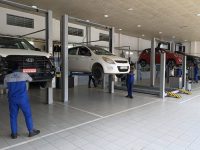The Future of Starter Technology and Its Impact on Commercial Vehicle Repair

The essential parts of commercial vehicles, especially the starting technology, also change with time. In the past, internal combustion engine igniting has been facilitated by mechanical and electric starting methods. But as hybrid and electric car types have become more popular, starting system functioning has changed significantly. Advanced features like smart diagnostics, energy efficiency, and improved performance capabilities are already being integrated into emerging technologies. These developments not only improve vehicle dependability but also change the way that commercial vehicle maintenance and repair are provided.
New Developments in Starter Systems
The most recent developments in starter technology have a number of encouraging characteristics. For example, sophisticated sensors and computer-aided diagnostics are being added to contemporary starting systems. In addition, as battery-electric cars become more popular, new starting systems are being developed to function well in high-voltage settings. Modern technologies, such start-stop systems, may maximize fuel economy without sacrificing engine responsiveness. These developments mark a major departure from the past and point to a day when starter systems will be essential for energy management and vehicle diagnostics in addition to starting engines. Choosing the service of Auto Repair in Centennial, CO would be the right choice in this case.
Consequences for Repair Services
The commercial vehicle repair business is being significantly impacted by the switch to advanced starting systems. As cars becoming increasingly complex, repair businesses have to adjust to new training standards and technological advancements. To properly diagnose and fix these systems, technicians will need the acquisition of new skill sets. Furthermore, the incorporation of smart technology will need the purchase of sophisticated diagnostic instruments by repair firms to manage the complexity of contemporary beginnings. This change offers chances for seminars and training courses targeted at providing technicians with state-of-the-art repair abilities. In the end, maintenance services that advance with technology will be more equipped to satisfy fleet operators’ shifting needs.
The Impact on Management of Fleets
Emerging starting technologies are likewise set to alter the field of fleet management. Fleet managers will have unrivaled access to vehicle performance data with integrated diagnostics, enabling them to proactively maintain and repair cars. As data analysis is used to anticipate breakdowns before they happen, predictive maintenance—which reduces downtime and perhaps overall ownership costs—will become more practical. Fleet managers may improve overall fleet dependability, operational efficiency, and vehicle availability by simplifying operations using sophisticated starting systems. Therefore, businesses looking to maximize their commercial operations may find that using these new technology gives them a competitive edge.
Prospective Aspects to Take into Account
The future of starter technology in commercial vehicles presents obstacles, as does any technical breakthrough. The need for ongoing innovation and training expenditures will necessitate cooperative efforts from fleet managers, service providers, and manufacturers. Furthermore, the switch from conventional to sophisticated systems might raise questions about how well-suited older cars are to receive the latest innovations.







